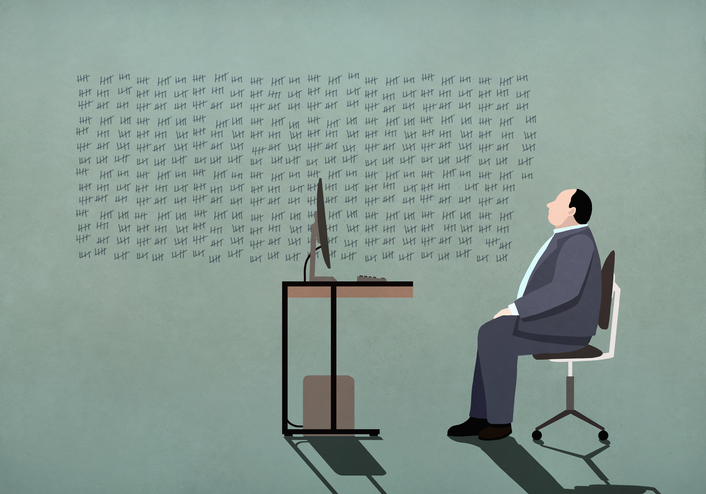How to Tell the Boss You’re Burned Out
We’re sharing more at work these days, but it can be risky to confess to being overwhelmed.
You’re burned out at work. Does your manager need to know?
More than half of workers surveyed by the Conference Board in September said their mental health has degraded since the start of the pandemic, with rising workloads and blurred boundaries as top culprits. Companies have stayed lean after layoffs, and the recent flood of job quitters means workers who stay have more to do. Nearly two years of a global health crisis have left us feeling overwhelmed—and getting more comfortable admitting it.
“So much was happening in the world that it became ok to say, ‘Yeah I’m not good,’ because nobody was good,” says Taisha Caldwell-Harvey, founder of the Black Girl Doctor, a therapy and corporate wellness practice. “More people are open to saying, ‘I need help.’ ”
Still, talking about burnout with a boss isn’t the same as talking about it with a friend. Stigma around mental-health challenges is real, psychologists warn. How can you get some breathing room, and back to feeling like yourself, without jeopardizing your career?
You don’t need to share just for the sake of sharing, Dr. Caldwell-Harvey says. “The goal is to share so that you can ask for what you need.”
Assess what it would take to stop feeling overwhelmed, and think about whether you really require permission to get it. Can you attend virtual therapy on Thursday mornings without telling your boss? Do you need a deadline extension, different work hours or a leave of absence? Speak up if you need to, and mention burnout by name if your colleagues seem supportive of diverging viewpoints and mental-health struggles, Dr. Caldwell-Harvey says.
But keep it simple. Your manager isn’t your therapist, she adds.
For all the risk, a lot of positives can come from sharing how you’re really doing—deeper trust with colleagues, permission for others to open up, a nudge away from a pressure-cooker work culture toward something more humane. You could be less miserable, and so could everyone else.
Elizabeth Rosenberg, 42, felt herself approaching burnout a couple of years ago while working for an advertising firm. An earlier bout had landed her in the emergency room, suffering from an intense migraine that left her unable to move. She didn’t want to go back to that. But she worried she’d be perceived as weak or unable to handle her job if she confessed how she was feeling.
She came up with a specific ask: She wanted to take off an entire month. She picked August, when business tended to be slowest, and approached her boss in January, giving him plenty of time to prepare for her absence.
“There was no emotion in it,” she says of how she presented the idea. She told him she was burned out and would have to leave the company later that year if she couldn’t take a break. To her surprise, he said sure.
“If you don’t say something, nothing will change,” says Ms. Rosenberg, who went on to found the Good Advice Company, a marketing and communications consultancy in Los Angeles. “But you have to be brave enough to say something.”
Burnout can feel like a uniquely individual experience, as if you’re the only one who can’t keep pace. But workplace researchers say it isn’t just you.
Employees across industries feel worn down and used up because what they are being asked to do is unrealistic, says Erin Kelly, a professor at the MIT Sloan School of Management and co-author of the book “Overload: How Good Jobs Went Bad and What We Can Do About It.” The backlog of tasks, the lack of resources—it isn’t sustainable for long.
“There had already been a speedup in many jobs before the pandemic, and then we turned up that volume,” she says.
A yoga class or a meditation session isn’t going to fix the problem. Instead, Dr. Kelly’s research examining an overworked IT division at a Fortune 500 firm before the pandemic found that team interventions are what make a difference. Employees whose managers were trained to check in to see how they were doing personally and professionally, and to give them flexibility to work how they wanted, had significantly lower levels of burnout and psychological distress than a control group. They were also 40% less likely to quit.
Another thing that helped: workshops where folks shared their stress and plotted what the team could let go of, like superfluous meetings clogging their calendars.
“Employees reported that they just felt free,” Dr. Kelly says. “It’s going to be easier to approach as a collective project than to stick your own neck out as an individual.”
Anne Ngo started struggling last fall as the second wave of the pandemic hit Toronto, where she lives. Isolated in her apartment, working 12-hour days, she began having anxiety attacks, difficulty sleeping and back and shoulder pain. Demand at her job as a recruiter at Ada, which provides clients with AI chat bots, had come roaring back, and she was tasked with trying to fill 40 to 50 roles a quarter instead of the usual 20.
“I was just one person,” the 33-year-old said. She began to feel like a cog, never really having an impact as colleagues ordered up an ever-increasing number of new hires. Yet the job became her life.
“I just couldn’t shut off,” she says.
She waited until she had hit her goals for the quarter before approaching Chelsea MacDonald, the company’s senior vice president of operations.
“I needed to have leverage of, ‘I did well, but I did well compromising my own well-being, and I don’t think this is ok,’ ” Ms. Ngo says. “I’m pretty sure I just blurted out everything I’d been holding for months.”
Ms. MacDonald says she’s happy Ms. Ngo spoke up. Ms. Ngo started therapy and acupuncture, while Ms. MacDonald talked to other teams to help reduce the demands on her.
“The honest answer is the workload just has to change,” Ms. MacDonald says. Instead of workers suffering, “the business needs to feel a little bit of pain.”
By January, Ms. Ngo had won a promotion and was able to hire for her own team, to spread the load. She sometimes wishes she had said something earlier about her burnout.
Talking about it, she says, “was a relief.”
 Copyright 2020, Dow Jones & Company, Inc. All Rights Reserved Worldwide. LEARN MORE
Copyright 2020, Dow Jones & Company, Inc. All Rights Reserved Worldwide. LEARN MORE
This stylish family home combines a classic palette and finishes with a flexible floorplan
Just 55 minutes from Sydney, make this your creative getaway located in the majestic Hawkesbury region.
As Paris makes its final preparations for the Olympic games, its residents are busy with their own—packing their suitcases, confirming their reservations, and getting out of town.
Worried about the hordes of crowds and overall chaos the Olympics could bring, Parisians are fleeing the city in droves and inundating resort cities around the country. Hotels and holiday rentals in some of France’s most popular vacation destinations—from the French Riviera in the south to the beaches of Normandy in the north—say they are expecting massive crowds this year in advance of the Olympics. The games will run from July 26-Aug. 1.
“It’s already a major holiday season for us, and beyond that, we have the Olympics,” says Stéphane Personeni, general manager of the Lily of the Valley hotel in Saint Tropez. “People began booking early this year.”
Personeni’s hotel typically has no issues filling its rooms each summer—by May of each year, the luxury hotel typically finds itself completely booked out for the months of July and August. But this year, the 53-room hotel began filling up for summer reservations in February.
“We told our regular guests that everything—hotels, apartments, villas—are going to be hard to find this summer,” Personeni says. His neighbours around Saint Tropez say they’re similarly booked up.
As of March, the online marketplace Gens de Confiance (“Trusted People”), saw a 50% increase in reservations from Parisians seeking vacation rentals outside the capital during the Olympics.
Already, August is a popular vacation time for the French. With a minimum of five weeks of vacation mandated by law, many decide to take the entire month off, renting out villas in beachside destinations for longer periods.
But beyond the typical August travel, the Olympics are having a real impact, says Bertille Marchal, a spokesperson for Gens de Confiance.
“We’ve seen nearly three times more reservations for the dates of the Olympics than the following two weeks,” Marchal says. “The increase is definitely linked to the Olympic Games.”

Getty Images
According to the site, the most sought-out vacation destinations are Morbihan and Loire-Atlantique, a seaside region in the northwest; le Var, a coastal area within the southeast of France along the Côte d’Azur; and the island of Corsica in the Mediterranean.
Meanwhile, the Olympics haven’t necessarily been a boon to foreign tourism in the country. Many tourists who might have otherwise come to France are avoiding it this year in favour of other European capitals. In Paris, demand for stays at high-end hotels has collapsed, with bookings down 50% in July compared to last year, according to UMIH Prestige, which represents hotels charging at least €800 ($865) a night for rooms.
Earlier this year, high-end restaurants and concierges said the Olympics might even be an opportunity to score a hard-get-seat at the city’s fine dining.
In the Occitanie region in southwest France, the overall number of reservations this summer hasn’t changed much from last year, says Vincent Gare, president of the regional tourism committee there.
“But looking further at the numbers, we do see an increase in the clientele coming from the Paris region,” Gare told Le Figaro, noting that the increase in reservations has fallen directly on the dates of the Olympic games.
Michel Barré, a retiree living in Paris’s Le Marais neighbourhood, is one of those opting for the beach rather than the opening ceremony. In January, he booked a stay in Normandy for two weeks.
“Even though it’s a major European capital, Paris is still a small city—it’s a massive effort to host all of these events,” Barré says. “The Olympics are going to be a mess.”
More than anything, he just wants some calm after an event-filled summer in Paris, which just before the Olympics experienced the drama of a snap election called by Macron.
“It’s been a hectic summer here,” he says.

AFP via Getty Images
Parisians—Barré included—feel that the city, by over-catering to its tourists, is driving out many residents.
Parts of the Seine—usually one of the most popular summertime hangout spots —have been closed off for weeks as the city installs bleachers and Olympics signage. In certain neighbourhoods, residents will need to scan a QR code with police to access their own apartments. And from the Olympics to Sept. 8, Paris is nearly doubling the price of transit tickets from €2.15 to €4 per ride.
The city’s clear willingness to capitalise on its tourists has motivated some residents to do the same. In March, the number of active Airbnb listings in Paris reached an all-time high as hosts rushed to list their apartments. Listings grew 40% from the same time last year, according to the company.
With their regular clients taking off, Parisian restaurants and merchants are complaining that business is down.
“Are there any Parisians left in Paris?” Alaine Fontaine, president of the restaurant industry association, told the radio station Franceinfo on Sunday. “For the last three weeks, there haven’t been any here.”
Still, for all the talk of those leaving, there are plenty who have decided to stick around.
Jay Swanson, an American expat and YouTuber, can’t imagine leaving during the Olympics—he secured his tickets to see ping pong and volleyball last year. He’s also less concerned about the crowds and road closures than others, having just put together a series of videos explaining how to navigate Paris during the games.
“It’s been 100 years since the Games came to Paris; when else will we get a chance to host the world like this?” Swanson says. “So many Parisians are leaving and tourism is down, so not only will it be quiet but the only people left will be here for a party.”
This stylish family home combines a classic palette and finishes with a flexible floorplan
Just 55 minutes from Sydney, make this your creative getaway located in the majestic Hawkesbury region.






















